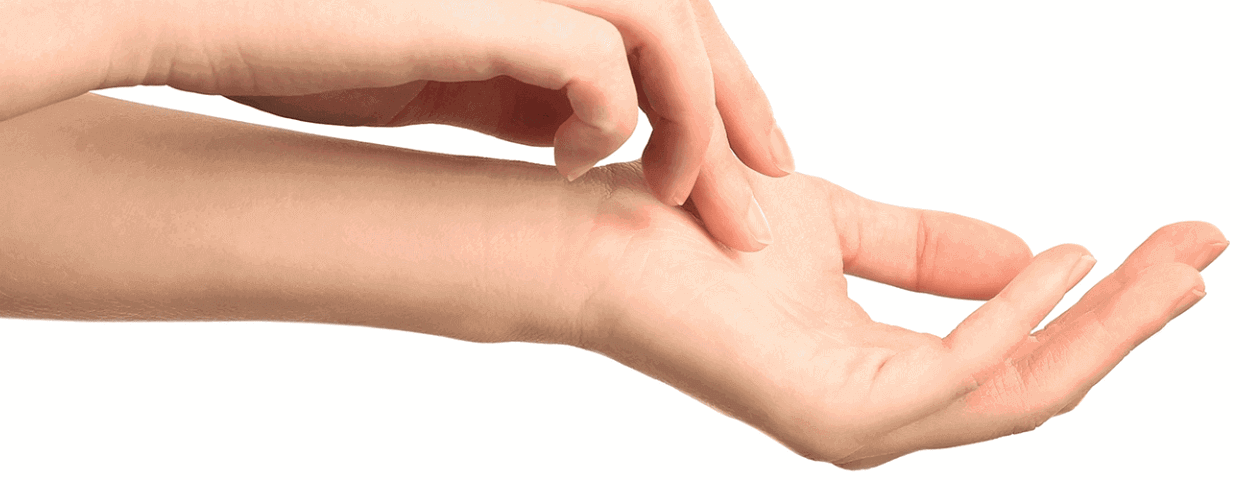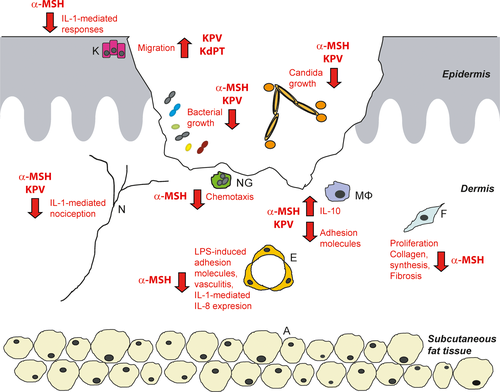
KPV (LYSINE-PROLINE-VALINE)
KPV is a peptide that is naturally produced in the body. It is found in the hormone alpha-MSH. This relatively newer peptide is an alpha melanocyte-stimulating hormone. The latest research on hormones in this class have shown immunomodulating and anti-inflammatory effects. KPV has many uses with both auto-immune and inflammatory conditions.
This peptide comes as a cream, injectable, and oral capsules. The route of administration depends on what area needs to be targeted. KPV works very well as a topical cream for things such as acne, eczema and psoriasis. In an oral form, it can help with ulcerative colitis, irritable bowel syndrome, and Crohn's disease. The injectable is used for an overall systemic anti-inflammatory effect.
Anti-Inflammatory
An overwhelming body of clinical evidence suggests that KPV exerts its strong anti-inflammatory properties through various important mechanisms. KPV exerts its anti-inflammatory function inside cells, where it inactivates inflammatory pathways. KPV can enter the cell and interacts directly with inflammatory signaling molecules. It enters the nucleus of the cell and once it’s there, it can inhibit the inflammatory substances and molecules. This leads us to the many benefits KPV has on the gut.
KPV can stop the proinflammatory mechanisms in both intestinal epithelial cells and immune cells. It can interact directly with immune cells which can reduce inflammation. KPV significantly decreased inflammation in colitis. It decreases the inflammatory response by inhibiting proinflammatory cytokine (molecule) synthesis and secretion. KPV may help in the case of IBDs through inhibited immune responses.
Taken orally, KPV decreases pro-inflammatory cytokines which can reduce the incidence of colitis.
Anti-Microbial
KPV also has antimicrobial effects against pathogens. Its antimicrobial effects were demonstrated on two major pathogens called S. aureus and C. albicans. In one study, KPV significantly inhibited S. aureus from forming colonies. KPV, with its anti-inflammatory and anti-microbial properties, can be very helpful for combatting these microbes and healing wounds.
Wound Healing/Skin
Research in wound healing shows KPV can speed wound healing, reduce infection, fight inflammation, and lead to better cosmetic results. These benefits occur at physiologic concentrations which means KPV could help prevent infection in the setting of serious wounds like burns.
KPV is able to reduce the kind of inflammation that leads to a hypertrophic scar (keloid) formation. Administering KPV (a-MSH) in this setting leads to smaller scars and less drastic inflammatory response. Part of the benefit in reducing scar prominence appears to come from its ability to modulate collagen metabolism.
KPV has significant antimicrobial and anti-inflammatory properties especially in those with psoriasis. Psoriasis is a chronic autoimmune condition that causes the rapid build-up of skin cells and is usually treated using hydrocortisone. In people with psoriasis, KPV has shown to limit symptoms of the condition including itchiness, dryness, redness, peeling, and more. Therefore, KPV could be used for an extended period of time without risking the unwanted complications of long-term steroid therapy.

Benefits of KPV
- Can treat a wide variety of inflammatory conditions
- Can strengthen the immune system
- Can acts as an anti-microbial
- Can improve skin health
- Used in healing wounds & injuries
- Helps with gut health, Inflammatory Bowel Diseases (IBD) and colitis
Conclusion
KPV is a potent anti-inflammatory peptide that can help many conditions. Most of the research involved is targeting the treatment of IBD (irritable bowel disease) where results have been very positive. KPV is shown to be safe when administered orally, subcutaneously and topically. KPV is a naturally derived peptide without any notable side effects. Research has shown that KPV offers a host of benefits that speed wound healing, reduce infection and fight inflammation.
Research
Luger TA, Brzoska T. alpha-MSH related peptides: a new class of anti-inflammatory and immunomodulating drugs. Ann Rheum Dis. 2007;66 Suppl 3(Suppl 3):iii52-iii55. doi:10.1136/ard.2007.079780
Dalmasso, G., et al. (2008). PepT1-Mediated Tripeptide KPV Uptake Reduces Intestinal Inflammation. Gastroenterology, 134(1), 166–178. DOI: 10.1053/j.gastro.2007.10.026
Rajora N, Boccoli G, Catania A, et al. α-MSH modulates experimental inflammatory bowel disease. Peptides. 1997;18:381–385.
Brzoska T, Luger TA, Maaser C, Abels C, Böhm M. Alpha-melanocyte-stimulating hormone and related tripeptides: biochemistry, antiinflammatory and protective effects in vitro and in vivo, and future perspectives for the treatment of immune-mediated inflammatory diseases. Endocr Rev. 2008 Aug;29(5):581-602. doi: 10.1210/er.2007-0027. Epub 2008 Jul 8. PMID: 18612139.
Brzoska T, Böhm M, Lügering A, Loser K, Luger TA. Terminal signal: anti-inflammatory effects of α-melanocyte-stimulating hormone related peptides beyond the pharmacophore. Adv Exp Med Biol. 2010;681:107-16. doi: 10.1007/978-1-4419-6354-3_8. PMID: 21222263.
Luger TA, Bohm M. Are melanocortin peptides future therapeutics for cutaneous wound healing? Experimental Derm. 20 January 2019. https://doi.org/10.1111/exd.13887
Elliott R J, Szabo M, Wagner M J, Kemp E H, MacNeil S, Haycock J W. alpha‐Melanocyte‐stimulating hormone, MSH 11‐13 KPV and adrenocorticotropic hormone signaling in human keratinocyte cells. J Invest Dermatol 20041221010–1019.
Sarkar A, Sreenivasan Y, Manna SK 2003 α-Melanocyte-stimulating hormone induces cell death in mast cells: involvement of NF-κB. FEBS Lett 549:87–93.
Redondo P, García-foncillas J, Okroujnov I, Bandrés E. Alpha-MSH regulates interleukin-10 expression by human keratinocytes. Arch Dermatol Res. 1998;290(8):425-8.
Mehta D, Granstein R, D: Immunoregulatory Effects of Neuropeptides on Endothelial Cells: Relevance to Dermatological Disorders. Dermatology 2019;235:175-186. doi: 10.1159/000496538
Sinha PS, Schiöth HB, Tatro JB. Roles of the melanocortin-4 receptor in antipyretic and hyperthermic actions of centrally administered alpha-MSH. Brain Res. 2004;1001(1-2):150-8
Taylor AW, Yee DG, Nishida T, Namba K. Neuropeptide regulation of immunity. The immunosuppressive activity of alpha-melanocyte-stimulating hormone (alpha-MSH). Ann N Y Acad Sci. 2000;917:239-47
Van de meent H, Hamers FP, Lankhorst AJ, Joosten EA, Gispen WH. Beneficial effects of the melanocortin alpha-melanocyte-stimulating hormone on clinical and neurophysiological recovery after experimental spinal cord injury. Neurosurgery. 1997;40(1):122-30
Abdel-malek ZA, Kadekaro AL, Kavanagh RJ, et al. Melanoma prevention strategy based on using tetrapeptide alpha-MSH analogs that protect human melanocytes from UV-induced DNA damage and cytotoxicity. FASEB J. 2006;20(9):1561-3
Bohm M, Wolff I, Scholzen TE, et al. alpha-Melanocyte-stimulating hormone protects from ultraviolet radiation-induced apoptosis and DNA damage. J Biol Chem. 2005;280(7):5795-802
Lam C W, Getting S J. Melanocortin receptor type 3 as a potential target for anti‐inflammatory therapy. Curr Drug Targets Inflamm Allergy 20043311–315.